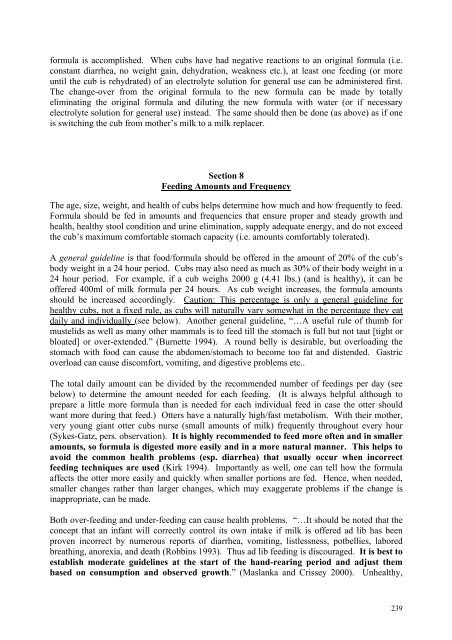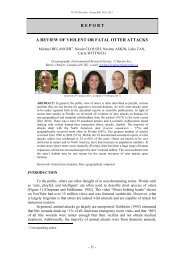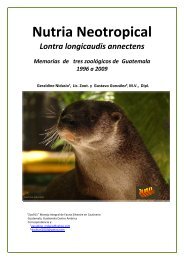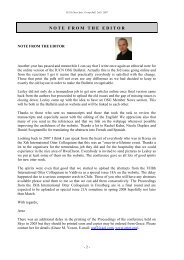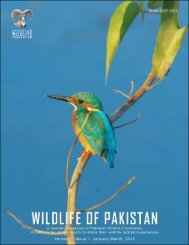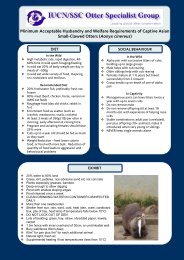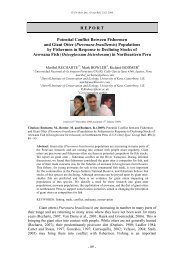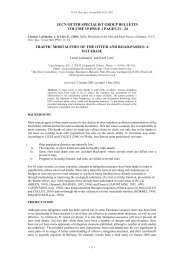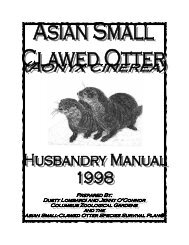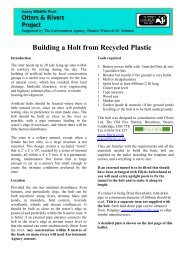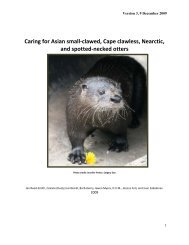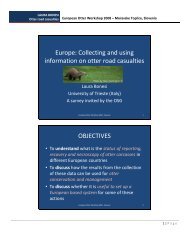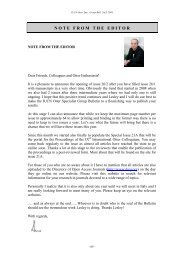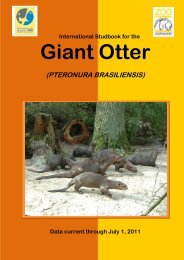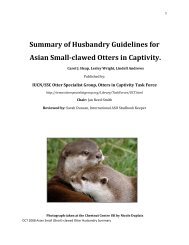International Giant Otter Studbook Husbandry and Management
International Giant Otter Studbook Husbandry and Management
International Giant Otter Studbook Husbandry and Management
Create successful ePaper yourself
Turn your PDF publications into a flip-book with our unique Google optimized e-Paper software.
formula is accomplished. When cubs have had negative reactions to an original formula (i.e.<br />
constant diarrhea, no weight gain, dehydration, weakness etc.), at least one feeding (or more<br />
until the cub is rehydrated) of an electrolyte solution for general use can be administered first.<br />
The change-over from the original formula to the new formula can be made by totally<br />
eliminating the original formula <strong>and</strong> diluting the new formula with water (or if necessary<br />
electrolyte solution for general use) instead. The same should then be done (as above) as if one<br />
is switching the cub from mother’s milk to a milk replacer.<br />
Section 8<br />
Feeding Amounts <strong>and</strong> Frequency<br />
The age, size, weight, <strong>and</strong> health of cubs helps determine how much <strong>and</strong> how frequently to feed.<br />
Formula should be fed in amounts <strong>and</strong> frequencies that ensure proper <strong>and</strong> steady growth <strong>and</strong><br />
health, healthy stool condition <strong>and</strong> urine elimination, supply adequate energy, <strong>and</strong> do not exceed<br />
the cub’s maximum comfortable stomach capacity (i.e. amounts comfortably tolerated).<br />
A general guideline is that food/formula should be offered in the amount of 20% of the cub’s<br />
body weight in a 24 hour period. Cubs may also need as much as 30% of their body weight in a<br />
24 hour period. For example, if a cub weighs 2000 g (4.41 lbs.) (<strong>and</strong> is healthy), it can be<br />
offered 400ml of milk formula per 24 hours. As cub weight increases, the formula amounts<br />
should be increased accordingly. Caution: This percentage is only a general guideline for<br />
healthy cubs, not a fixed rule, as cubs will naturally vary somewhat in the percentage they eat<br />
daily <strong>and</strong> individually (see below). Another general guideline, “…A useful rule of thumb for<br />
mustelids as well as many other mammals is to feed till the stomach is full but not taut [tight or<br />
bloated] or over-extended.” (Burnette 1994). A round belly is desirable, but overloading the<br />
stomach with food can cause the abdomen/stomach to become too fat <strong>and</strong> distended. Gastric<br />
overload can cause discomfort, vomiting, <strong>and</strong> digestive problems etc..<br />
The total daily amount can be divided by the recommended number of feedings per day (see<br />
below) to determine the amount needed for each feeding. (It is always helpful although to<br />
prepare a little more formula than is needed for each individual feed in case the otter should<br />
want more during that feed.) <strong>Otter</strong>s have a naturally high/fast metabolism. With their mother,<br />
very young giant otter cubs nurse (small amounts of milk) frequently throughout every hour<br />
(Sykes-Gatz, pers. observation). It is highly recommended to feed more often <strong>and</strong> in smaller<br />
amounts, so formula is digested more easily <strong>and</strong> in a more natural manner. This helps to<br />
avoid the common health problems (esp. diarrhea) that usually occur when incorrect<br />
feeding techniques are used (Kirk 1994). Importantly as well, one can tell how the formula<br />
affects the otter more easily <strong>and</strong> quickly when smaller portions are fed. Hence, when needed,<br />
smaller changes rather than larger changes, which may exaggerate problems if the change is<br />
inappropriate, can be made.<br />
Both over-feeding <strong>and</strong> under-feeding can cause health problems. “…It should be noted that the<br />
concept that an infant will correctly control its own intake if milk is offered ad lib has been<br />
proven incorrect by numerous reports of diarrhea, vomiting, listlessness, potbellies, labored<br />
breathing, anorexia, <strong>and</strong> death (Robbins 1993). Thus ad lib feeding is discouraged. It is best to<br />
establish moderate guidelines at the start of the h<strong>and</strong>-rearing period <strong>and</strong> adjust them<br />
based on consumption <strong>and</strong> observed growth.” (Maslanka <strong>and</strong> Crissey 2000). Unhealthy,<br />
239


